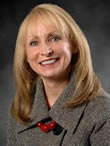can't see the images? view this message online.

Public Affairs Discussion Group
|
| Avoiding Vaccinations: Reasons and Consequences |
 |
Irena L. Kenneley, PhD, RN, APHRN-BC, CIC - Associate Professor of Nursing at the Frances Payne Bolton School of Nursing at Case Western Reserve University |
Friday April 24, 2015
12:30-1:30 p.m.
Dampeer Room
Kelvin Smith Library
Case Western Reserve University
Dear Colleagues:
When Autumn arrives, the leaves begin to fall and the CDC recommends that people get vaccinated to prevent flu. But most people don't. Why?
Flu and complications after having flu (such as pneumonia) are estimated to kill thousands of Americans each year. Vaccines do not kill people. So any risk from the vaccine may seem much less than the risks of doing without it. Yet many people seem to disagree. Are they overestimating the vaccine risk? Underestimating the flu risk? Or just not paying attention?
Adults avoiding flu vaccines is an old story. But, increasingly, adults are preventing their children from being immunized for other diseases, such as measles and whooping cough. Measles was declared "eliminated" in the United States in 2000. But in 2014 there were over 600 cases. Those were largely related to unvaccinated Amish communities in Ohio and travelers from the Philippines. But there have also been occasional outbreaks related to other unvaccinated groups. This year, about 140 people were infected in an outbreak related to visits to Disneyland in California. The California Department of Public Health reported on April 17 that the outbreak is over, but noted the risk of further outbreaks when high numbers of unvaccinated foreign tourists mix with a California population that also has significant gaps in vaccination rates.
Join us as Professor Kenneley reports on her own research about why adults avoid the flu vaccine and on the broader issue of objections to vaccinations for children.
This Friday Lunch discussion on April 24 will be the final gathering for Spring Semester. We will pick up again on the first Friday of Fall Semester 2015, so on August 28. So this is my opportunity to express my heartfelt thanks to all the speakers and the participating audience who make the Public Affairs Discussion Group work. Thank you, thank you, and have a great Spring and Summer.
All best regards,
Joe White
Luxenberg Family Professor of Public Policy and Director, Center for Policy Studies
About Our Guest
Irena L. Kenneley teaches microbiology, infection control and public health to undergraduate and graduate nursing students. Dr. Kenneley has 30 years experience across the continuum in health care delivery and as an infection control nurse.
Dr. Kenneley began her career as a microbiologist and medical technologist. She has worked in numerous areas within nursing and infection control including critical care, risk management and performance improvement. In 2002 she joined the faculty of the Frances Payne Bolton School of Medicine at Case Western Reserve University. She has expertise in research, infection prevention, microbiology, immunology, home health care and pandemic planning. She frequently speaks to the media on infectious disease issues including H1N1 flu.
The recipient of numerous awards, Dr. Kenneley is currently working on two research projects in the area of infection prevention. She was the chair of APICs Research Committee, and has been the Home Care Section Chair. She is a member of many other professional organizations including the Sigma Theta Tau International Nursing Honor Society, the Midwest Nursing Research Society and the Ohio Nurses Association.
Dr. Kenneley graduated from Lake Erie College in Painesville, Ohio with a Bachelor in Science and received her MSN in Public Health Nursing, and PhD from Case Western Reserve University, Cleveland, Ohio.
Where We Meet
The Friday Public Affairs Lunch convenes each Friday when classes are in session, from 12:30 p.m. to 1:30 p.m. We usually meet in the Dampeer Room of Kelvin Smith Library. The Dampeer Room is on the second floor of the library. If you get off the elevators, turn right, pass the first bank of tables, and turn right again. Occasionally we need to use a different room; that will always be announced in the weekly e-mails.
Parking Possibilities
The most convenient parking is the lot underneath Severance Hall. We regret that it is not free. From that lot there is an elevator up to street level (labeled as for the Thwing Center); it is less than 50 yards from that exit to the library entrance.
You can get from the Severance garage to the library without going outside. Near the entry gates - just to the right if you were driving out - there is a door into a corridor. Walk down the corridor and there will be another door. Beyond that door you'll find the entrance to an elevator which goes up to an entrance right inside the doors to Kelvin Smith Library.
|
|
|